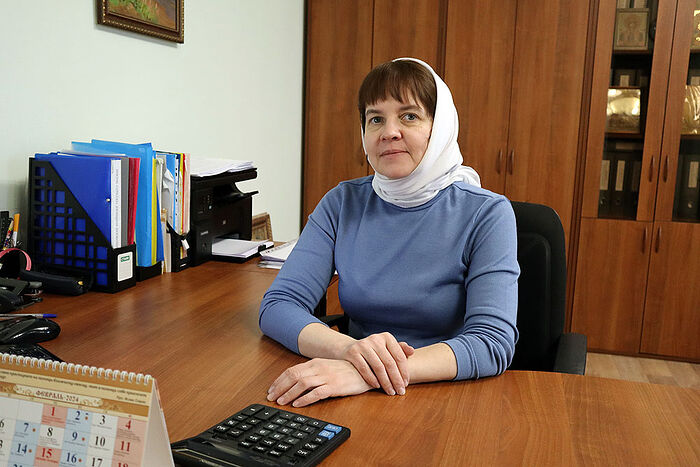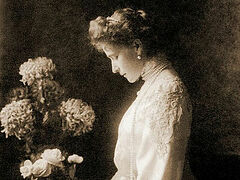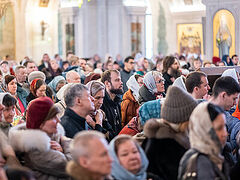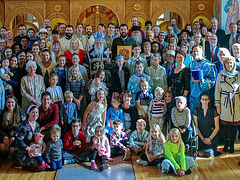Everyone has a destined path, and occasionally, Providence leads professionals to serve the Church. We offer our readers an interview with Elena Yuryevna Blinova, Deputy Chief Accountant of the Vyatka Diocese who also works as a treasurer of three large parishes in Kirov (the Holy Dormition Cathedral, the Church of the Great Martyr and Healer St. Panteleimon, and the Church of the Nativity of the Most Holy Mother of God in Chistye Prudy microdistrict).
 Elena Yuryevna Blinova, Deputy Chief Accountant of the Vyatka Diocese
Elena Yuryevna Blinova, Deputy Chief Accountant of the Vyatka Diocese
Former soviet schoolchildren and the mysterious ways of God
—Elena Yuryevna, please tell us how you found your faith and embraced the Church?
—I grew up during Soviet times and attended a Soviet school where the concept of faith or God wasn’t part of the curriculum. We didn’t have Sunday school; in fact, we were taught that there was no God. Our beliefs were shaped by this kind of Soviet propaganda.
Once I told my grandmother that there was no God. She only replied, “They teach you the wrong things at school.”
My great-grandmother was a believer. She faced numerous challenges throughout her life, including the loss of three of her children. During the last two years of her life, she lived with us. She was always reading the Psalter, so once I told her that there was no God. She only replied, “They teach you the wrong things at school.” And that was it. She never imposed anything upon me, and generally the beliefs of every family member peacefully coexisted.
In 1988, when I was in high school, our country was celebrating 1000 years of Christianity in Russia. Only then did I begin to realize that the world didn’t function as we had been taught.
At school we would often ask each other about baptism, but I never truly grasped what it really meant. I would say that I was baptized by my grandmothers at home, not in a church.
In fact, I was baptized when I was in the eleventh grade. It was my mother’s idea. The sacrament took place on January 31, 1993, when I was seventeen. I had no idea how a Christian was supposed to lead a spiritual life. My mother and I bought some books in the church, but they turned out to be more of a compilation of Russian folk proverbs and sayings about the Church traditions. The book had a brief collection of prayers at the end. I tried to understand them and memorize, “Our Father”, but it was like a foreign language to me, and the only thing I remembered was the prayer before going to bed, “Into Thy hands, Lord Jesus Christ, my God, I commend my spirit…” Since then, this prayer has remained with me, and I found myself reciting it constantly, even during my student years.
I first learned about the events of the Gospels from the books that Jehovah’s Witnesses brought to our apartment. Nobody ever told us about the earthly life of the Savior, His passions, and Resurrection, and no programs on these subjects were ever shown on TV. However, in the 1990s, numerous sects rushed into our country, and their members began going door-to-door. It was clear to me that this was a sinful sect—I felt it instinctively—but nonetheless, we accepted the brochure. It was from this brochure that I first learned about our Lord and Savior Jesus Christ.
I became a practicing Christian in 2000 after graduating from the University at the age of 24. The soul of every person is searching for the meaning of life, and God always reaches out to those who are seeking Him. While I was in the University, I was trying to find the meaning of life in the books of various psychologists, like Dale Carnegie, Louise Hay and Maxwell Maltz and other authors who taught us “how to live”. I began to follow their advice, but soon understood that it wasn’t the answer and that their principles didn’t work. The churches were already open and easily accessible, yet I would make up thousands of reasons and pretexts not to attend the worship service. At that time, I wasn’t aware that there was a dark force at play, preventing you from going. Each time I went to church, it required significant effort on my part. Naturally, God was a distant concept for me. He seemed to be somewhere out there, while I was here, and it felt like my life didn’t have a direct dependence on Him or any connection with Him.
God guided us, the generation that had grown up without Him, by His mysterious ways
People often turn to God in times of sorrow and illness, when they have no other recourse, so coming to church is the last resort for them. God guided us, the generation that had grown up without Him, through His mysterious ways. My journey towards becoming a practicing Christian was both interesting and unique.
Throughout my life I sensed an invisible force exerting a negative influence on us, but didn’t understand that we were being affected by some sort of demonic realm because we lived without God, and the spiritual world remained closed and unfamiliar to us. Yet I had a feeling that this invisible dark realm existed. It is hard to put into words, but I was aware of its powerful impact. I didn’t know how to get rid of it and felt that I needed someone to help me. And I did get help. I met people who told me that it was necessary to attend church and pray to God. They also explained the nature of our existence, delving into the concepts of good and evil and clarifying the forces behind them. God touched my heart and suddenly everything became crystal clear to me. It all happened quickly, almost instantaneously. As I began to pray, the invisible dark realm somehow became more active, and God allowed me a glimpse beyond the confines of reality. This contact with the demonic realm induced a visceral fear unlike anything I had ever felt before. It made me rush to church, feeling that it was where I belonged, and since then, the idea of leaving my sanctuary has never crossed my mind.
Meeting God is always an unforgettable experience. It always stays vivid and untarnished. People may forget some things, but this meeting will never fade from memory. It is my driving force that gives me the strength to live. I always keep in mind that there’s another life, a life without God, and I am aware of the dark force behind it—I know that it is pure evil…
Under the Protection of St. Seraphim of Vyritsa
—Have you ever experienced the intercession of heavenly forces or the saints you’ve been praying to?
—The first book I read after becoming a practicing Christian was the Holy Gospel. I remember eagerly rushing home to read it. My first spiritual book was about Seraphim of Vyritsa, and I have felt his support throughout my life. It is said that when you read about a saint, that saint is praying for you.
I’ve always thought that you must ask God for spiritual things only, like salvation of your soul, mercy or forgiveness of sins. Asking for material values seemed inappropriate to me. However, when I read Seraphim of Vyritsa’s book, I learned that in the Soviet times people used to come to him with their housing problems. They would tell him that they had no place to live, and he would console them and help them resolve certain material issues. I had also difficulty buying an apartment. It seemed impossible to do as the prices continued to rise and there was no way I could keep up with them. In 2006, when mortgages became available, I came across a suitable solution. I knew that this was my chance to buy a place to live. When I checked the calendar and saw that it was April 3—the day we commemorate Seraphim of Vyritsa—I became certain that everything would work out. And indeed, it did work out; two weeks later I already signed the mortgage agreement and bought an apartment. I also passed my driver’s license test on April 3.
—How did you start working as a church accountant?
—I first started working in a church in 2003. At that time, I met some spiritual friends and one of them had been ordained into priesthood and appointed a priest of the church of Sts. Peter and Paul in Sharkan Village, Republic of Udmurtia. I was helping him submit reports to tax authorities. When a new priest was appointed, he also asked me for assistance. So I worked in this parish from 2003 to 2007.
—Have you worked as an accountant in the secular world? What was your profession before you joined the Church?
—My first degree is in education. I graduated from the Psychology and Education Faculty of the State University of Udmurtia, specializing as a teacher of economics. However, I never had the opportunity to work as a teacher in a school. I pursued my second degree at the same university, graduating from the Department of Economy with a specialization in financial management. Later, I also completed an accounting course.
I began my accounting career in a small business, serving as an accountant for a small wholesale company while also providing assistance to other organizations. Later, I worked in a large bank in Izhevsk. The bank operated as a holding company, comprising various subsidiaries. My responsibilities included all aspescts of accounting, such as VAT, profit tax, fixed assets, leasing, securities, claim assignment agreements, payroll and even compliance with the Russian Accounting Standard PBU 18. As this company was subject to mandatory accounting audits, its accounting system was impeccable. I worked with a team of brilliant chief accountants who were so proficient with the Tax Code that they read it as if it were a captivating novel. I recall that time with gratitude and respect, as I learned a lot from them. Certainly, my experience working in both a small business and a large banking organization proved to be quite useful during my time in the church. I still rely on my professional expertise that I gained in the secular world, although I do need to constantly update my skills to keep up with the changes in the law.
—So you come from Udmurtia. How did you end up in Vyatka region?
—As I’ve mentioned before, I received my education in Izhevsk. However, I was born in Kizner Village, the Republic of Udmurtia, and lived there till 1993. In 1993 I enrolled at the State University of Udmurtia, and lived in Izhevsk until 2011.
One can say that my relocation to Vyatka region was a forced migration, because that was what my husband wanted. We got married in Izhevsk. Once, my husband attended the Velikoretsky procession and was deeply impressed by it. He had relatives here, so he simply told me, “We’re moving to Vyatka region”. The move as very stressful for me—if I were to liken it to an earthquake, it would be a 10-point earthquake.
The Best Place for Work and Ministry
—How did you land a job at the diocese?
—Naturally, God has a purpose for everybody. Since 2002 to 2011 I was a parishioner of the Alexander Nevsky Cathedral in Izhevsk where they had the icons of St. Tryphon of Vyatka, blessed Procopius, and St. Victor of Glazov. I have always venerated them and recognized the historical connection, as Izhevsk and the Republic of Udmurtia were formerly part of the Vyatka Governorate. These saints might have had something to do with my coming to the Vyatka diocese. Mother Maria (Maria Bychkova, the chief accountant of the Vyatka diocese.—L.B.) believes that it was St. Tryphon who sent me to Vyatka.
When I moved to Kirov, I went to the nearest church right away. It was the Trinity Church in Kstinino Village. Abbot Theodore (Rulev) was the priest of this church in 2011. At that time, I was overwhelmed with stress and couldn’t even think about looking for a job. I shared my concerns about the move with Father Theodore. He told me, “The diocese needs an accountant. Perhaps you could give it a try?” At first, I didn’t say anything. When he offered it to me the second time, I said that I’d think about it. When he told me they needed an accountant for the third time, I agreed. He arranged for a meeting with Sr. Maria and we went to the diocese for the interview.
When we met the chief accountant of the diocese, she reviewed my resume and asked, “Can you do all of this?” I said that I could. She asked me if I attended church. I said “Yes” and that was all it took. The next question was, “When can you start?”
After a while she told me, “When I talked to you, I had a strong feeling that you were meant to come and help our diocese.”
After a while she told me, “When I talked to you, I had a strong feeling that you were meant to come and help our diocese.” Probably she had been praying for help in her own way… After that, I didn’t pursue any other job opportunities. I regarded this role as my calling to serve the Church, and I have never entertained the idea of looking for a different job or discontinuing this ministry.
The first thing that surprised me was that Mother Maria told me, “Vladyka is not here today, but I will definitely tell him about you.” I was very surprized that Vladyka, the archpriest overseeing the diocese, would take an interest in a regular accountant performing routine tasks. However, when Vladyka returned, he met with me, and we had a conversation.
Knowing that I was stressed because of the move, Sr. Maria was always concerned that I might not be able to handle it all and would quit and return to Izhevsk. So every time I had to go home for a while, I would always reassure her by saying, “I’ve bought the return ticket, so don’t worry, I’m coming back”.
Vladyka also mentioned that I should commit to working in the church for a certain period of time. I agreed and promised to work with Vladyka for a certain number of years. The agreed term has not yet ended, so I prefer not to disclose its duration. Of course, there are certain unwritten rules of the Church—for example, when God leads you to work in the Church, you cannot leave—I learned it from my grandmothers who worked in the church in Izhevsk in the Soviet times. They used to say, “You can be expelled from the church, but you cannot leave on your own.” That’s why I always recommend working for God, as the Church is the best place for work and ministry.
To be continued…



